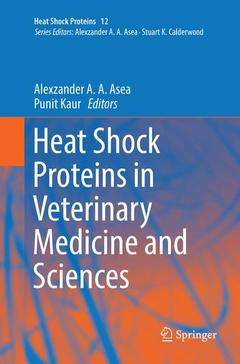Heat Shock Proteins in Veterinary Medicine and Sciences, 1st ed. 2017 Published under the Sponsorship of the Association for Institutional Research (AIR) and the Association for the Study of Higher Education (ASHE) Heat Shock Proteins Series, Vol. 12
Coordonnateurs : Asea Alexzander A. A., Kaur Punit

For easy readability, the book is sub divided into sections on HSP in the following aspects of Veterinary Medicine, including, I - Domestic Animals, II - Poultry, III - Aquatic and IV - Parasites.
The book is a must read for heat shock protein researchers in general and specifically those involved in clinical and research in veterinary medicine.
SECTION I: DOMESTIC ANIMALS
Chapter 1: Thermotolerance in Domestic Ruminants: A HSP70 Perspective
Iqbal Hyder, Manjari Pasumarti, Poonooru Ravikanth Reddy, Chigurupati Srinivasa Prasad, Kamisetty Aswani Kumar and Veerasamy Sejian
Department of Veterinary Physiology, NTR College of Veterinary Science, Gannavaram, India
Chapter 2: Expression Dynamics of Heat Shock Proteins (HSP) in Livestock under Thermal Stress
Satyaveer Singh Dangi, Jaya Bharati, Hari Abdul Samad, Sanjeev Kumar Bhure, Gyanendra Singh, Vijai Prakash Maurya, Mihir Sarkar and Puneet Kumar
Temperate Animal Husbandry Division, Indian Veterinary Research Institute Campus, Mukteshwar, India
Chapter 3: Heat Shock Protein Expression and Implications in Spontaneous Animal Tumors: Veterinary and Comparative Aspects
Romanucci Mariarita, Mariarita Romanucci and Leonardo Della Salda
Veterinary Pathology Unit, Faculty of Veterinary Medicine, University of Teramo, Teramo, Italy
Chapter 4: Heat Shock Protein as an Adjuvant in Veterinary Vaccines
Sohini Dey, C. Madhan Mohan, R. Saravanan, Hemanta Kumar Maity, Kalpana Yadav, Dinesh C. Pathakand Ashis Debanth
Recombinant DNA Laboratory, Division of Veterinary Biotechnology, Indian Veterinary Research Institute, India
SECTION II: POULTRY
Chapter 5: Antioxidant Systems and Vitagenes in Poultry Biology: Heat Shock Proteins
Peter F. Surai and Ivan I. Kochish
Department of Microbiology and Biochemistry, Faculty of Veterinary Medicine, Trakia University, Stara Zagora, Bulgaria
Chapter 6: Heat Shock Protein and Thermal Stress in Chicken
Shanmugam Murugesan, Rajkumar Ullengala, and Vinoth Amirthalingam
ICAR-Directorate of Poultry Research, Rajendranagar, India
SECTION III: AQUATIC
Chapter 7: Heat Shock Proteins in Fish Health and Diseases: A Pharmacological Perspective
Kartik Baruah, Parisa Norouzitallaband Peter Bossier
Laboratory of Aquaculture & Artemia Reference Center, Department of Animal Production, Department of Animal Production, Faculty of Bioscience Engineering, Ghent University, Ghent, Belgium
Chapter 8: Physiological Role of Heat Shock Proteins, Molecular Function and Stress Removal inFishes
Shib Sankar Sen and Sib Sankr Giri
School of Life Sciences, Jawharlal Nehru University, New Delhi, India
Chapter 9: The Role of Heat Shock Proteins in Response to Extracellular Stress in Aquatic Organisms
Li Lian Wong and Do Dinh Thinh
Institute of Tropical Aquaculture (AKUATROP), Universiti Malaysia Terengganu, Kuala Terengganu, Malaysia
Chapter 10: Heat Shock Proteins in Aquaculture Disease Immunology and Stress Response of Crustaceans
Peng Li
Jiangsu Key Laboratory for Biodiversity and Biotechnology and Jiangsu Key Laboratory for Aquatic Crustacean Diseases, College of Life Sciences, Nanjing Normal University, Nanjing, Jiangsu, China
SECTION IV: PARASITES
Chapter 11: Heat Shock Proteins in Parasitic Flatworms
Yadong Zheng, Xiaola Guo, Jin’en Wu, Jing Yang and Xiaoliang Jin
State Key Laboratory of Veterinary Etiological Biology, Key Laboratory of Veterinary Parasitology of Gansu Province, Lanzhou Veterinary Research Institute, CAAS, Lanzhou, China
Chapter 12: Heat Shock Proteins: Role, Functions and Structure in Parasitic Helminths
Hui-Yu Chen, Yi-Sheng Cheng and Hsiu-Hui Shih
Department of Life Science, National Taiwan University, Taipei, Taiwan, Republic of China
Chapter 13:Heat Shock Proteins and Blood-Feeding in Arthropods
Marcos H. Pereira, Rafaela M. M. Paim, Chloe Lahondere and Claudio R. Lazzari
Instituto de Ciências Biológicas, Universidade Federal de Minas Gerais, Belo Horizonte, Brazil
Chapter 14:Heat Shock Proteins in Leptospirosis
Arada Vinaiphat and Visith Thongboonkerd
Medical Proteomics Unit, Office for Research and Development, Faculty of Medicine Siriraj Hospital, Mahidol University, Bangkok, Thailand
Chapter 15: Heat Shock Proteins in Vector-pathogen Interactions: TheAnaplasma phagocytophilumModel
Pedro J. Espinosa, Pilar Alberdi, Margarita Villar, Alejandro Cabezas-Cruz and José de la Fuente
SaBio. Instituto de Investigación en Recursos Cinegéticos IREC (CSIC-UCLM-JCCM), Ciudad Real, Spain
The only book that combines studies of the role of HSP in Veterinary Medicine and Sciences in one volume
Contains coloured images of unique model systems
Easy to read and understand, making it a must read for graduate students, clinicians and researchers
Written by eminent veterinary researchers performing clinical and basic research
Covers HSP in domestic animals, poultry, aquatic and parasites
Date de parution : 12-2018
Ouvrage de 398 p.
15.5x23.5 cm
Disponible chez l'éditeur (délai d'approvisionnement : 15 jours).
Prix indicatif 158,24 €
Ajouter au panierDate de parution : 04-2018
Ouvrage de 398 p.
15.5x23.5 cm



